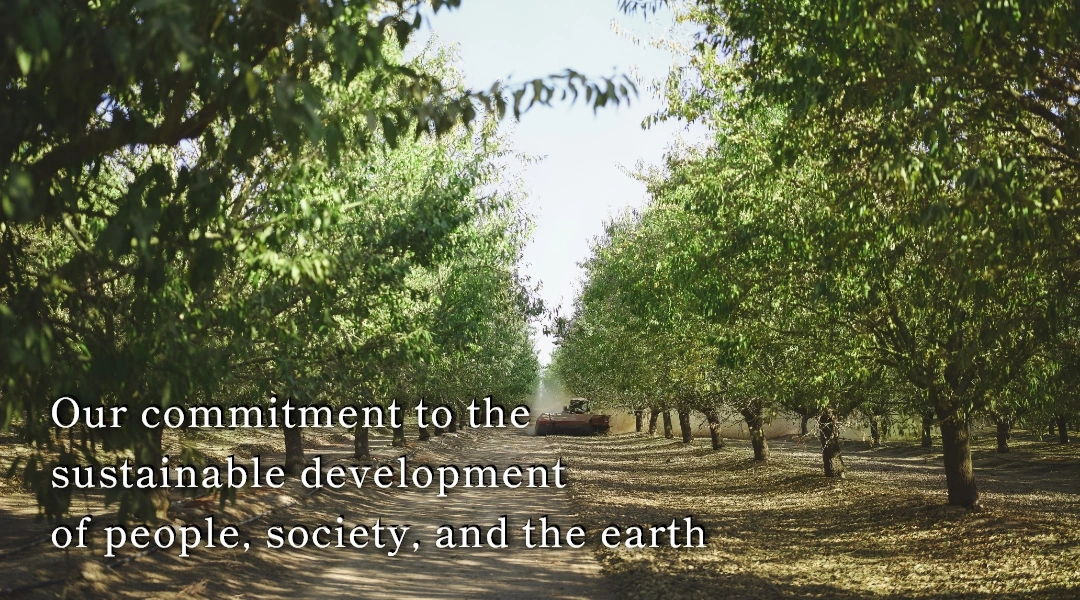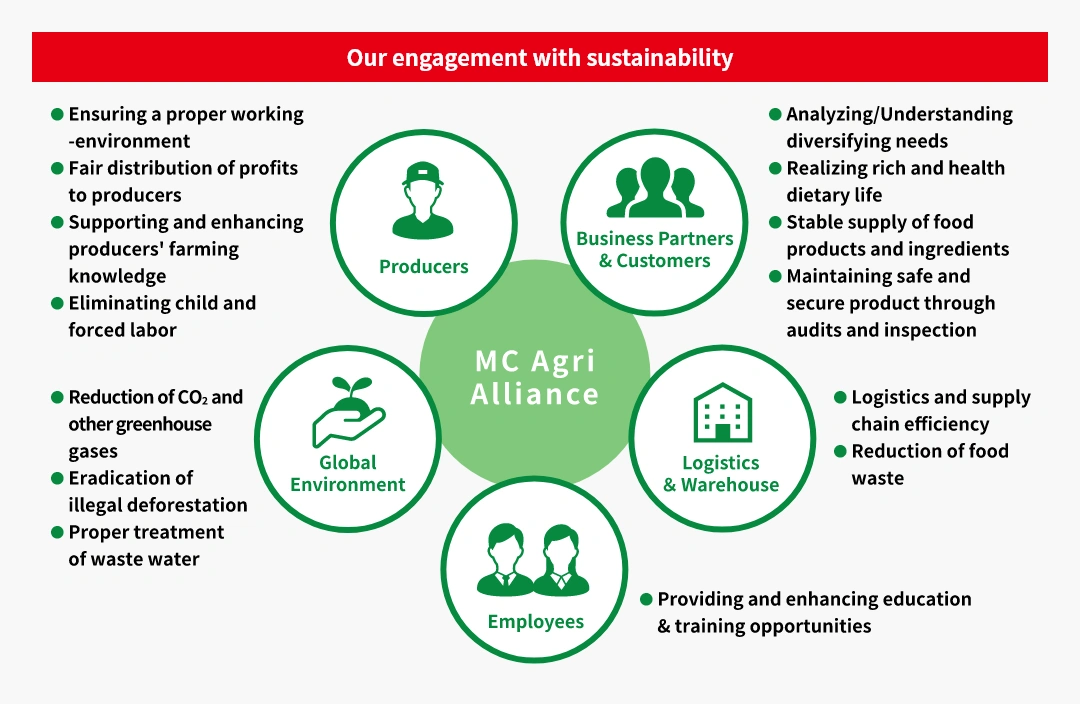
1Sustainability Statement
We are committed to working with producers and business partners around the world to address a range of environmental and social issues throughout our supply chain. To contribute to the realization of a prosperous society for all, from source to consumer, and to the sustainable development of society, we will provide a stable supply of food ingredients and value-added products that meet the needs and preferences of consumers and business partners, in a workplace where employees feel a sense of purpose, while respecting the global environment, human rights and the livelihoods of producers and local communities.

- Code of Conduct
- Key Sustainability
Issues
(Materiality) - Procurement Policy
2Sustainability
Code of Conduct
We will address sustainability issues through ongoing dialog and collaboration with all stakeholders to help people live spiritually enriched lives, and we will achieve a sustainable society with this Code of Conduct in mind.
- We will protect the global environment.
- Protecting the global environment is one of the most important initiatives for us as we provide the blessings of nature around the world. We will promote measures such as forest conservation and the appropriate use of water resources, as well as the preservation of the natural environment by optimizing logistics and reducing waste.
- We will respect the human rights and livelihoods of producers.
- There are still many social issues in the lives of producers who supply agricultural products. We do not ignore issues such as child labor and forced labor. We will achieve sustainable production activities for producers through agricultural support and infrastructure support.
- We think from a consumer perspective.
- We provide products that help consumers enjoy a rich and healthy diet, taking into account the changing social environment and diversifying needs.
- We ensure safe, secure and stable food supply
and responsible food procurement. - Ensuring the safety and security of food ingredients is a fundamental responsibility for any company involved in food. We strive for thorough quality control and a stable supply of food ingredients that are familiar to many consumers, as well as responsible sourcing.
- We continue to learn and grow.
- We strive to improve our human resources capabilities by providing effective education and training opportunities both internally and externally to provide optimal solutions in response to the ever-changing business environment.
3Key Sustainability Issues (Materiality)
To achieve a sustainable society, we analyze the environment surrounding our business and define the following key sustainability issues to be addressed.
- A:Preserving the natural environment
-
- Reducing CO2 and other greenhouse gases
- Eliminating illegal deforestation
- Appropriate wastewater treatment
- Improve logistics and supply chain efficiency
- Reduced food loss
Sustainable Development Goals
- B:Respect for human rights
-
- Ensuring a proper working environment
- Fair distribution of profits to producers
- Supporting and enhancing producers’ farming knowledge
- Eliminating child and forced labor
Sustainable Development Goals
- C:Responding to diversified consumer needs
-
- Analyzing and understanding the needs of customers and
consumers - Achieving a rich and healthy diet through the import of food ingredients and product development
Sustainable Development Goals
- Analyzing and understanding the needs of customers and
- D:Safe, secure, and stable food supply
-
- Maintenance of quality control standards and prevention of
accidents through factory audits - Preventive maintenance through product inspections and confirmation of product quality
- Maintenance of stable supply through business continuity plans
Sustainable Development Goals
- Maintenance of quality control standards and prevention of
- E:Human resources development and education
-
- Providing and enhancing education and training opportunities
for employees
Sustainable Development Goals
- Providing and enhancing education and training opportunities
4Sustainability
Goals and Actions
We will implement the following policies and measures to address and address important sustainability issues and ensure a stable supply of products.
1.MC Agri Alliance’s Procurement Policy
(Materiality: A and B)
We comply with the Sustainable Supply Chain Action Guidelines of its parent company, Mitsubishi Corporation, and communicates its views on human rights, labor issues, the global environment, and other issues to its suppliers around the world, encouraging their acceptance, understanding, and implementation of the items set forth below.
Procurement Policies by Product
We have developed separate procurement policies for the following products:
- 1Coffee bean procurement policy
-
We are engaged in the procurement and sale of coffee beans and products made from coffee, although it is not engaged in the plantation business. Much of the production of coffee beans comes from producers in developing countries located in tropical regions near the equator. In the production areas, environmental and social issues have been pointed out, such as a decrease in production areas due to global warming, environmental pollution caused by inadequate wastewater treatment, human rights problems for workers and child education problems caused by poverty, and poor production efficiency caused by lack of farming knowledge and materials.
Under these circumstances, we have worked with suppliers such as IPANEMA (Brazil) and FNC (Colombia), including its shareholder Olam, to procure sustainable coffee beans, and has taken initiatives to protect the natural environment related to coffee bean production, address human rights and labor issues, and address child education issues.
In addition, we have established a Coffee Bean Procurement Target to evaluate the supply chain and identify and improve issues. -
Procurement Target
- 100% procurement of sustainable coffee beans (*) by 2030
- Annually disclose the amount and ratio of sustainable coffee beans procured
(*) Sustainable coffee beans: coffee beans that are sourced from farmers who care about the protection of the natural environment and respect the human rights of workers (Coffee beans sourced from suppliers who purchase from farmers who meet Olam's procurement standards, the Olam Supplier Code, or equivalent standards.)
- 2Cacao bean procurement policy
-
We are engaged in the procurement and sale of cacao beans and products made from cacao, although it is not engaged in the plantation business. Cacao beans are mainly produced in Ghana, Cote d’Ivoire, and Ecuador. In the production areas, illegal deforestation to expand agricultural land exists, and since most of the farmers are small-scale farmers, environmental and social issues such as human rights of workers caused by poverty, education of children, and poor production efficiency caused by lack of farming knowledge and materials have been pointed out.
Under these circumstances, we have worked with Olam, a shareholder, to procure sustainable cacao beans, and has taken initiatives related to forest conservation related to cacao bean production, human rights and labor issues, and child education issues.
We support the Living Income Differential, which was introduced to ensure that production farmers receive a fair price, and purchases cacao beans only from properly paid supply sources. We will also actively participate in the World Cacao Foundation, which aims to build a sustainable chocolate supply chain.
Furthermore, we have established a “cocoa bean procurement target” to evaluate the supply chain and identify and improve issues. -
Procurement Target
- 100% procurement of sustainable cocoa beans (*) by 2030
- Annually disclose the amount and ratio of sustainable cocoa beans procured
(*) Sustainable cocoa beans: Cocoa beans that are sourced from farmers who care about the protection of the natural environment, respect the human rights of workers, and do not engage in illegal deforestation or child labor (Cocoa beans sourced from suppliers who purchase from farmers who meet Olam's procurement standards, the Olam Supplier Code, or equivalent standards).
- 3Palm oil procurement policy
- Although we do not have a plantation business, it does have domestic trade in products made from palm oil. We follow the procurement guidelines for palm oil issued by our parent company, Mitsubishi Corporation, when handling products made from palm oil.
2.Sustainability Actions
(Materiality: A and B)
For our major products, priority environmental and social issues are selected for each product, and action plans are established to promote sustainable procurement in each area. We also regularly report on the progress of our activities.

3.Responding to Diversified Consumer Needs
(Materiality: C)
- 1Market Analysis
- We independently analyze what stakeholders want most now. To meet the needs of our consumer goods manufacturers and retailers, as well as consumers, we regularly conduct PEST analysis and consumer trend analysis to understand the latest social trends and diversify consumer awareness, which will lead to product development.
- 2Enhancing our product development capabilities
- We will develop products that meet the latest consumer needs by organically linking the technology and knowledge of our food manufacturing companies, which are our business partners, to create new products. To this end, we will use the extensive network of our shareholders, Mitsubishi Corporation and Olam, to keep abreast of the latest developments in the food manufacturing industry and establish a platform to lead product development by communicating regularly with each company.
- 3Providing raw materials and products that meet the needs
- Based on its global raw materials procurement network and combining our unique market analysis and product development capabilities, we will provide raw materials and products that meet the needs and tastes of customers and consumers.
4.Safe, secure, and stable food supply
(Materiality: D)
- 1Factory audit
- We audit its subcontracted factories and supplier factories to prevent contamination by foreign materials, food poisoning, allergen contamination, food mislabeling, and other serious accidents that could cause harm to the lives or bodies of consumers through eating, improving quality control levels, and checking compliance with rules, including laws and regulations.
- 2Inspection
- To prevent accidents in the products we procure and sell, we check the quality of products by inspecting pesticide residues and purchasing them. We will expand and promote our monitoring system to provide safe and secure products.
- 3Stable supply
- We formulate a business continuity plan to clarify and prioritize important operations that should continue even in times of emergency such as major disasters. We also maintain a stable supply of products by conducting education and training to confirm the functions of the prescribed means and methods.
5.Human Resource Development and Education
(Materiality: E)
We emphasize and implement employee development and education not only to enhance economic value but also to continuously create social and environmental value. In addition to on-the-job training in the workplace, we provide opportunities for our employees to continue to learn and grow on their own through measures such as the enhancement of external training and lecture programs that utilize online.
【Revision History】
Established: March 30, 2022












